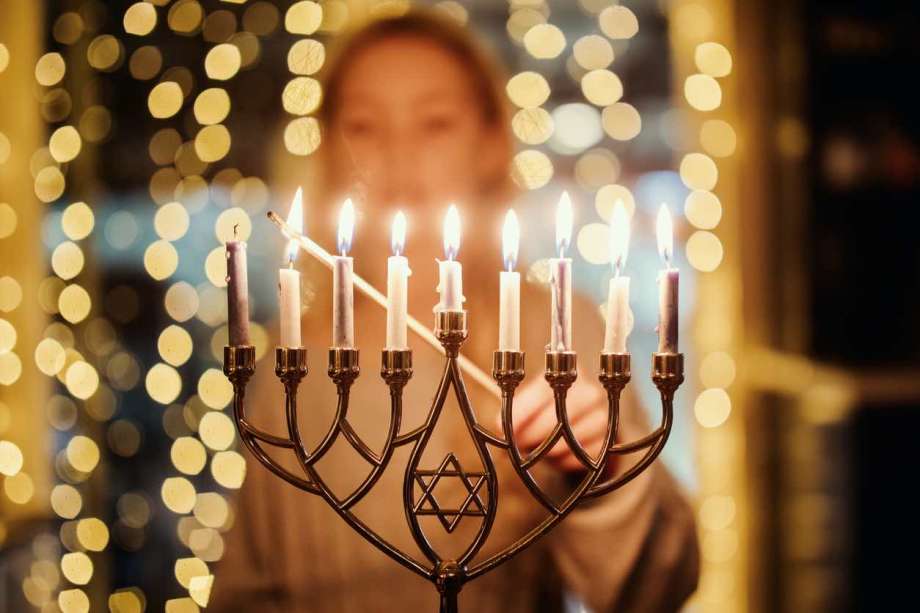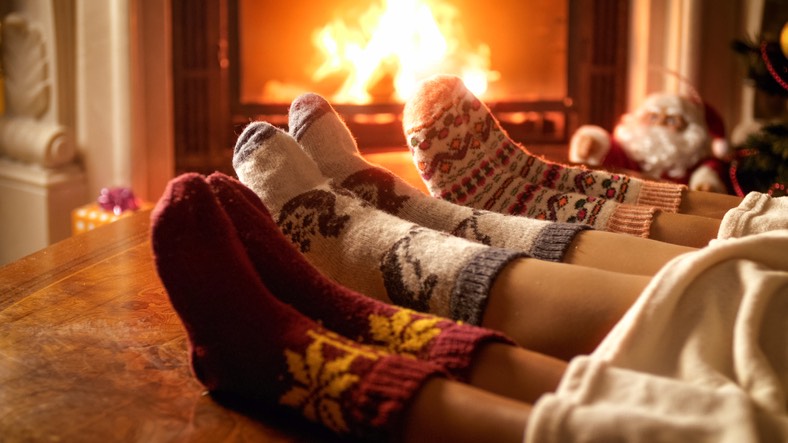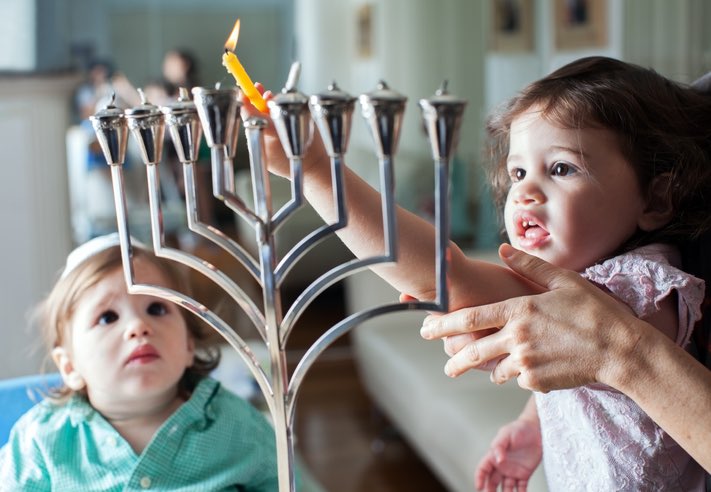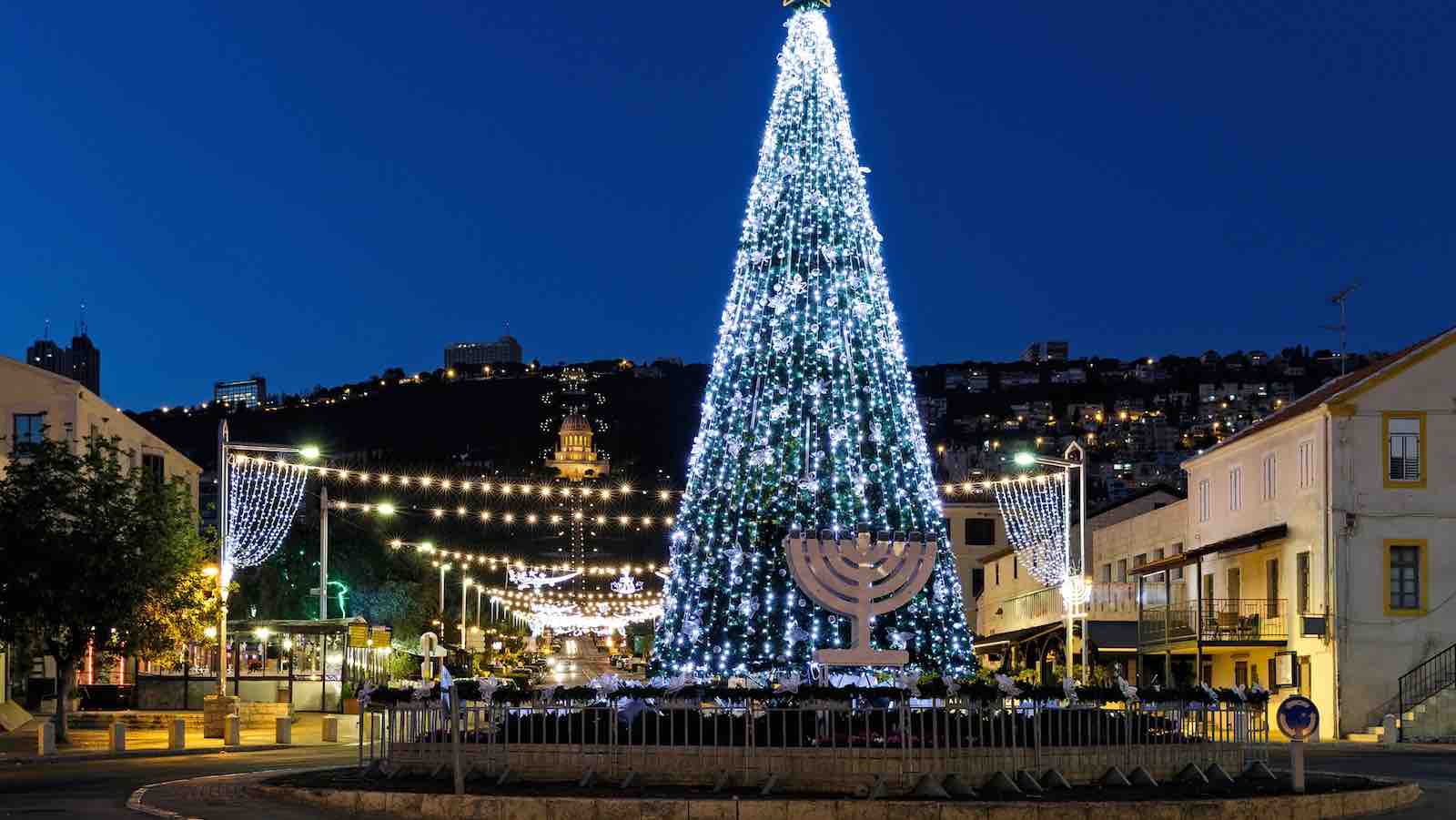Understanding How Jewish and Interfaith Families Navigate the “Christmas Season”

It’s 10 a.m. on a chilly December morning and I’m sitting uncomfortably on a carpet square watching my three-year-old son, giddy with musical glee, jumping up and down as a collar-clad clergyman strums “Happy Birthday, Baby Jesus” on an acoustic guitar. It’s the pre-k Christmas party and I’m completely sure that my mother, my son, and I are the only Jewish people in the room.
Yes, I’m Jewish. Yes, my son is Jewish (or at least, the half he gets from me is). And yes, he went to a Catholic daycare center that threw the baby Jesus a Christmas party. I knew this could, and would, happen. So, the awkward holiday encounter was completely expected. If you’re wondering why a Jewish mother would enroll her child in a Catholic pre-k, the answer is simple – it was the best of the many, many centers I visited. Even though this was possibly one of the most uncomfortable moments for me, it actually wasn’t as awkward as some of those, 'Ohhhh, I didn’t realize you're Jewish” Christmas memories.
Navigating the Christmas Season as a Jew

“So, are you ready for Christmas yet?” For years I’ve heard this question and replied with a half-smile and a “sure.” The truth is, I do get a tree, I do buy Christmas presents, and I’ve taken my kiddo to sit on Santa’s lap at the mall every holiday season since he was four-months-old. But we’re also Jewish – at least my son and I are.
Technically, my husband and I are an interfaith couple. Officially, I’m Jewish and my husband (who was raised as Catholic-Protestant) is agnostic. Growing up, I went to Hebrew school three times a week, had a Bat Mitzvah, and definitely did not have a Christmas tree, Christmas dinner, Christmas presents, or Christmas visits with St. Nick. My son’s interfaith December holidays typically looked very different from mine. Even though his non-Jewish side made a tree and all the trimmings an option, it didn’t negate the challenges that come along with being Jewish during the Christmas season.
If it seems like the Christmas season pretty much kicks off the moment we pack up our littles’ costumes, put the pumpkins out to pasture, and start dividing up the super-sized stash of Halloween candy into mini lunch-time dessert bags, you’re not mistaken. The calendar flips to November 1st and suddenly the glow of red and green twinkle lights swaths the neighbor’s yards, ‘Rudolph’ is playing on repeat, and every local parents’ FB group feed is filled with questions about the best gifts to get five-year-olds, which local Santa is the best, and where to find the cutest Chritsmas pic min-sessions.
And if you’re wondering where the posts about ‘the top eight Hanukkah presents are’ – well, they don’t exist.
Navigating the December holiday season as someone who is Jewish and has a Jewish/interfaith child isn’t exactly easy. I truly don’t believe that the people in my life and around me are purposefully neglectful of the fact that I have a Jewish family. But that doesn’t mean it isn’t any less obvious that early November through the end of December is ‘Christmas time.’
The "Christmas" Label

Back in the day, when I was one of three Jewish kids in my elementary school class, Hanukkah was a non-issue. As far as my upper middle class suburban school was concerned, it (along with Rosh Hashanah, Yom Kippur, and anything else that didn’t involve a man in a big red suit or an Easter bunny that hand-delivered chocolate eggs to children) just didn’t exist. We had a ‘Christmas Mart’ that was filled with penny and nickel gifts to give our family, had a Christmas (not holiday, but full-on Christmas) party before Christmas (not winter, but full-on Christmas) break, and sang Christmas carols while decked out in red and green garb at our Christmas concert.
If we fast-forward a few decades, my son’s elementary holiday experience doesn’t look the same. Instead of a ‘Christmas mart’ they had a ‘Holiday market.’ Of course, some years the school held it in the middle of or after Hanukkah. Instead of a Christmas party, they had a Holiday party. That too was typically held after Hanukkah ended. It also included a smorgasbord of tree-shaped cookies, red cupcakes with green sprinkles, and candy canes that the kiddos ate from little paper Santa plates.
Instead of a Christmas break, our district now has a winter vacation. Which is technically in the winter – but solely revolves around Christmas. What does all of this mean for parents who, like me, are raising Jewish or interfaith children? Growing up as one of the very few Jewish children in a predominantly Christian area (with a few interfaith families as well) and as a Jewish parent raising an interfaith child in the same predominantly Christian area, I’ve learned a few lessons about navigating the Christmas season.
Lessons I Learned Raising My Jewish Child
1.You don’t need to educate every person every time.
I don’t feel the need to launch into a 45-minute monologue on how asking me if I’ve finished my Christmas shopping, and not mentioning anything about a menorah, is insulting. Do I feel a bit insulted at times? Yes. Do I feel the need to sit my son’s basketball coach down and explain to them why they shouldn’t just assume that I’m Christian, Catholic, or anything other than Jewish? No.
2. You can educate some people.
While I don’t feel the need to respond to every, “Have you started baking cookies for Santa yet?” comment, it sometimes helps to provide some non-Jewish friends and acquaintances with basic information about your culture. This doesn’t have to include a mini lesson in the history of the Hanukkah holiday. Instead, I encourage others to ask about ‘the holidays’ and not ‘Christmas’, or just remind them that while it’s perfectly okay to talk about their December celebrations, they shouldn’t assume that everyone else has the same experiences.
3. Most people aren't purposefully trying to exclude Jewish or interfaith couples during this time of year.
Yes, I could ba-humbug my mommy friends when they ask me what’s on my Christmas list and invite me to their ‘secret Santa' circles. But would that really help anyone? A cheery, “Merry Christmas” or, “So, what’s Santa bringing your kids?” aren’t anti-semetic slurs. They’re just part of the holiday hype. And, that’s perfectly okay in my book.
4. Holiday celebrations are unique to each family.
We light the menorah. We make latkes. We get a Christmas tree. We visit Santa at the mall. “The O.C.” had Chrismukkah, and we have our own version of the December holidays. Raising a Jewish or interfaith child isn’t the same for every parent. This means you need to create a holiday celebration that is meaningful and feels comfortable for your family.

How Can Jewish and Interfaith Families Navigate Christmas?
Should you let your kiddo hang with Santa? Are stockings filled with candies okay if you’re not celebrating Christmas? What’s the role of the Jewish spouse on Chrismukkah planning? These are common questions for Jewish people during the December dilemma. Christmas is a religious holiday. And for interfaith or Jewish parents, navigating this time of year can be confusing.
Whether your child goes to Hebrew school three times a week (I did, but my son didn’t) and you attend Sabbath services weekly or you’re all in for a Christmas Eve cookie bake-off, what you do and what you don’t do is your choice. Again, the path you create and the way you introduce the winter celebrations to your child depends on your beliefs, values, and comfort level.
But there are some concerns or challenges that might be more universal for Jewish and interfaith families. If any of the below resonates with you, I hope my tips are helpful.
1. Do you worry that your child will feel left out?
The other kids can’t stop talking about their Elf On the Shelf - and your child is on the verge of making up a Christmas story of their very own to feel like part of the conversation. Yes, your child may feel left out of some of the more popular Christmas traditions. But this doesn’t mean that they can’t have traditions of their own. Let your child know their feelings are valid. Encourage them to discuss sadness or anger that they may feel during this time of the year. Address the issue and make your child feel special with a few holiday traditions that your family creates.
2. Are you unsure about whether to get a Christmas tree or not?
There’s a world of difference between going to a church service and stringing blinking lights on a pint-sized pine tree. If a tree is out of the question for your family, you could create your own Hanukkah-ized version if that’s something that feels right for you. My parents decided against a tree when I was little. As the story goes (I was four and don’t really remember), I decorated our standing coat rack with paper ‘ornaments’ as a way to make my own tree.

Image Source: MyJewishLearning.com
3. Do you feel as though you ought to have a family reunion because all your child's friends are spending Christmas eve with their families?
December 24th doesn’t have to hold a special religious meaning to make it a family night. Turn your Jewish home into a setting for a family reunion or a post-Hanukkah gathering. Invite the in-laws over, make your family’s favorite meal, and just have dinner together.
4. Are you worried about the "Santa isn't coming" fiasco?
The man in the big red suit is a tricky subject to bridge with your Jewish child. They have questions – and you don’t want your answers to ruin the magic of Christmas for your child’s Protestant, Catholic, or other Christian friends. But at the same time, you don’t want your child to think that Santa isn’t coming because they're on the ‘naughty list.’ Navigating the ‘Santa's not coming’ situation takes some serious finesse and a whole lot of creativity. Keep the conversation simple and explain that Santa is part of a holiday that your family doesn’t celebrate.
5. Does your child want to attend church?
Peer pressure is peaking and your child doesn’t understand why their Protestant and Catholic friends get to go to midnight mass, but they have to stay home. You have a Jewish family, a Jewish identity, and have your own Jewish religious practices and religious traditions – and can explain these things to your child in an age and developmental appropriate way. Remind your child that they go to temple on shabbat or during other Jewish holidays (Rosh Hashanah and Yom Kippur), celebrate Passover, and have other ways of experiencing religion that don’t involve a Christian or Catholic church service.
Focusing on the Positives

A 2020 Pew Research Center survey found that intermarriage between Jews and non-Jews is on the rise, with six out of 10 Jewish Americans choosing a spouse of another religion. Interfaith couples don’t and won’t all celebrate the December holidays in the same way. Some families, like mine, will choose to merge Christmas and Hanukkah. Others may prefer to pick one over the other.
My husband isn’t religious. But he’s not against me teaching our son about my religion. During Hanukkah, I light the menorah with our son, and in his younger years, gifted him with eight nights of presents (okay, it’s more like seven teeny tiny gifts and one more substantial present).
Even though my husband doesn’t talk about God, go to church, or subscribe to any one religion, he enjoys the festive parts of Christmas. And here’s where many of our family traditions come into play.
We go to the same farm every year to buy a Christmas tree. Every year I make my son stand in front of the same crazy-giant decorated tree inside of the farm’s greenhouse and smile for a pic. Every year. (Seriously, He’s in college now and I have 20 years worth of the same picture).
We also watch at least two or more of the 24-hour “Christmas Story'' marathon together and, until recently, always ate special Christmas morning donuts. Last year we started a new, and totally cringe-worthy, holiday tradition of a Christmas morning “Elf” breakfast. Yes, that’s right, I made spaghetti and we slathered it in maple syrup, chocolate, sprinkles, Pop Tart pieces, and mini marshmallows ala Buddy’s elfish speciality.
When it comes down to it, navigating the holiday period as an interfaith couple or as a Jewish parent means that you may have to deal with some potentially uncomfortable situations or discussions. But the December dilemma isn’t something to fear. Embrace it and use this time as a way to build your own family religious traditions and help your child to learn about their Jewish identity. After all, Dr. Seuss showed us that when a holiday comes without ribbons, tags, packages, boxes, and bags, it can mean “a little bit more.”
Are you looking for Hanukkah themed activities to try with your children? Check out our holiday crafts and more!

